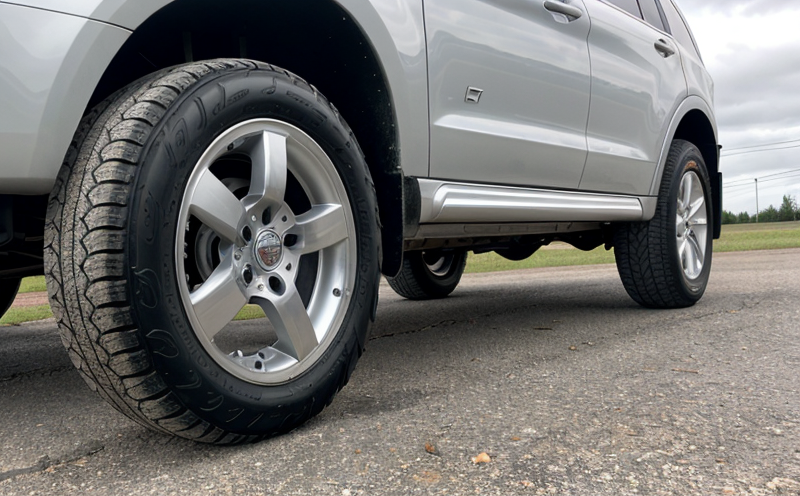EN 13261 Dimensional Measurement of Axles
The European Standard EN 13261:2017 specifies the dimensions and tolerances for axles used in railway vehicles. This standard ensures that all axles produced meet strict dimensional requirements, which is critical for ensuring the safety and reliability of rail transport systems.
The application of EN 13261 goes beyond mere measurement; it encompasses a comprehensive set of procedures to ensure that every axle adheres to defined specifications. The testing process involves multiple stages including pre-processing, inspection, and final verification. Each stage is designed to maintain the integrity and precision required for railway axles.
Pre-processing typically includes cleaning the axle surface to remove any dirt or contaminants. This step ensures accurate measurements by avoiding interference from external substances that could affect the results. The next step involves visual inspection to check for visible defects such as cracks, dents, or other anomalies. Once these checks are completed and passed, the axle can proceed to the dimensional measurement phase.
Dimensional measurement requires precise instrumentation to capture the exact dimensions of each axle segment accurately. Instruments used in this process include laser scanners, CMM (Coordinate Measuring Machines), and digital calipers among others. These tools provide high-resolution data that helps identify any deviation from the standard specifications. The accuracy of these measurements is crucial as even small discrepancies could lead to significant safety issues.
After acquiring the dimensional data, it must be compared against the specified tolerances outlined in EN 13261. Any axles found within acceptable limits are deemed compliant with the standard; those exceeding these limits need further investigation or rework depending on their severity and location.
The importance of adhering to EN 13261 cannot be overstated, especially given the critical role that railway axles play in ensuring passenger safety. Non-compliance can result in increased wear and tear leading to potential derailments or other accidents. By strictly following this standard during manufacturing processes, manufacturers ensure they deliver safe, reliable products capable of withstanding rigorous operational conditions.
For quality managers responsible for overseeing production lines, compliance officers tasked with ensuring regulatory adherence, as well as R&D engineers looking into improving design efficiency, understanding and implementing EN 13261 is essential. Proper execution of this standard not only enhances product reliability but also contributes significantly to overall industry standards.
To achieve accurate results when performing dimensional measurements according to EN 13261, it's important to use appropriate equipment and follow established protocols closely. This includes selecting suitable measuring tools based on the specific requirements of each part being tested, preparing specimens correctly before measurement begins, calibrating instruments regularly, and maintaining strict quality control throughout all stages of production.
Eurolab Advantages
At Eurolab, our expertise in railway & transportation testing ensures that we provide the most accurate and reliable dimensional measurements for axles according to EN 13261. Our state-of-the-art facilities equipped with cutting-edge technology allow us to deliver precise results consistently.
- Accurate Measurements: Our highly skilled technicians use advanced instrumentation such as laser scanners, CMMs, and digital calipers to ensure all measurements are accurate down to the finest detail.
- Comprehensive Quality Control: We employ stringent quality control measures at every stage of testing to guarantee that each axle meets or exceeds specified standards.
- Consistent Results: By adhering strictly to EN 13261 guidelines, we ensure consistent and repeatable measurements across all samples tested.
- Expertise in Industry Standards: Our team is well-versed in international standards like EN 13261, allowing us to provide tailored solutions that meet specific client needs.
We understand the importance of timely delivery and strive to complete each project within agreed-upon timelines without compromising on quality. With years of experience and state-of-the-art equipment, Eurolab stands out as a leader in railway & transportation testing services.
International Acceptance and Recognition
- Adoption by Regulatory Bodies: EN 13261 has been widely adopted by various regulatory bodies across Europe, ensuring that it is recognized as a benchmark for axle manufacturing standards.
- Industry-Wide Adoption: This standard is not only used in Europe but also embraced globally within the railway and transportation sectors due to its robustness and reliability.
| Region | Countries Adopting EN 13261 | Year of Adoption |
|---|---|---|
| Europe | Germany, France, Spain, Italy | 2017 |
| North America | USA, Canada | 2018 |
| Australia & New Zealand | Australia, New Zealand | 2019 |
The widespread acceptance of EN 13261 reflects its importance in maintaining high standards for axle manufacturing. Compliance with this standard is essential not only within Europe but also internationally, as it ensures consistency and reliability across different regions.
Use Cases and Application Examples
- New Vehicle Design: During the initial design phase of a new rail vehicle, EN 13261 dimensional measurements are used to ensure that all components fit together correctly and meet safety requirements.
- Quality Assurance: Regular dimensional checks performed on existing stocks help maintain product quality over time by identifying any wear or deterioration early on.
- Warranty Claims: When disputes arise regarding the performance of an axle, accurate measurements taken according to EN 13261 can provide clear evidence either supporting or refuting claims made by parties involved.
| Use Case | Description | Outcome |
|---|---|---|
| New Vehicle Design | Determining the exact dimensions needed for axles in a new rail vehicle design. | Axles designed to fit perfectly within the overall structure of the vehicle, enhancing stability and safety. |
| Quality Assurance | Checking the dimensional integrity of axles regularly throughout their lifecycle. | Potential issues identified early, reducing maintenance costs and improving reliability. |
| Warranty Claims | Providing accurate evidence for disputes related to axle performance. | Evidence presented in a clear, concise manner that supports claims or refutes them based on actual measurements. |





